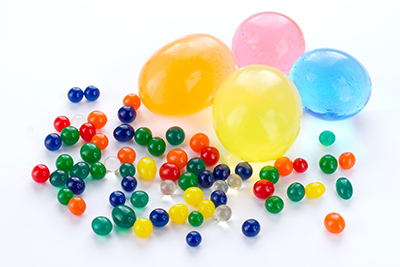Water beads are a popular kids’ toy made up of small polymer balls that expand in water to create a squishy, sensory experience (Orbeez are a popular brand, but they go by other names as well). They have been in the news lately due to a popular social media trend known as the “Orbeez Challenge” in which kids freeze the little balls and use a pellet gun to shoot them. While that challenge is dangerous, these small, gel balls pose an even simpler threat to kids.
Like most kids’ toys, water beads are small and brightly colored, and they look a lot like candy, boba balls or gum, especially before the water beads have expanded to full size. Unfortunately, it’s very easy for small children to put these colored balls in their mouth, ears or nose. If they are consumed — even one — this can lead to choking or bowel obstruction.
 Water beads are designed to expand in water. So, when ingested, they can expand enough in a few hours to block the intestine or airway of a small child. If the water bead does not pass through the digestive system, surgery is needed to remove them. Although product makers claims that these beads are non-toxic and pose no danger to the digestive system, we at Children’s Wisconsin are seeing an increase in cases of serious injury. Over the last couple months, we have treated two kids who have ingested water beads — both actually each required two surgeries to remove them all. Water beads do not always show up on an X-ray, so it can be a challenge for doctors to identify the location of the beads in the body.
Water beads are designed to expand in water. So, when ingested, they can expand enough in a few hours to block the intestine or airway of a small child. If the water bead does not pass through the digestive system, surgery is needed to remove them. Although product makers claims that these beads are non-toxic and pose no danger to the digestive system, we at Children’s Wisconsin are seeing an increase in cases of serious injury. Over the last couple months, we have treated two kids who have ingested water beads — both actually each required two surgeries to remove them all. Water beads do not always show up on an X-ray, so it can be a challenge for doctors to identify the location of the beads in the body.
Prevention is key!
Children are naturally curious and discover new things by putting them in their mouth, ears and nose. Awareness and prevention are the best way to keep kids safe from ingesting water beads.
Here are a few tips to keep kids safe when playing with water beads:
- Always check the recommended age range on toys. The popular brand of water beads are recommended for kids 5 years old and older.
- Keep in mind older siblings who may have these toys around the house. Keeping older and younger siblings’ toys separate can help prevent younger children from getting their hands on toys that are not age appropriate.
- Allow kids to play with water beads toys only under adult supervision after they have expanded (per manufacturer instructions) and keep them safety stored away at all other times.
- Speak to your older children about not swallowing items that are not food.
Warning signs
Water bead ingestion can be very dangerous as the beads expand from the water in our bodies. Since these accidents can happen so quickly, caregivers might not be aware that something is wrong. Signs and symptoms your child has swallowed water beads include:
- Coughing/gagging
- Drooling
- Trouble swallowing
- Breathing faster, harder, or a consistent whistle noise with breathing
- Pain, discomfort and/or anxiousness
- Vomiting stomach contents or blood
- Throat pain
- Abdominal pain
- Chest pain
- Bloating
- Not eating
What to do
If you suspect your child has swallowed any water beads, call the Wisconsin Poison Center immediately at (800) 222-1222. Our colleagues at the Poison Center have received calls about these products and staff are very aware of the hazards associated with them. Each ingestion of a water bead would be handled uniquely, based on the specifics of the case. Foreign bodies — such as water beads, animal shaped toy sponges, toy magnets and kitty litter — consistently fall into the top 10 substances swallowed by children 5 years of age and younger reported to the Poison Center every year. In 2021 the poison center managed 911 exposure cases on these products.
Do not allow your child to eat or drink anything until assessed by a doctor and do not induce vomiting in your child. Call 911 right away if your child cannot breathe and their lips are blue. You should also call 911 if your child is vomiting blood.
No one ever wants to make a trip to the emergency room, but if the need arises, the Children’s Wisconsin Emergency Department and six urgent care locations are here for you.







